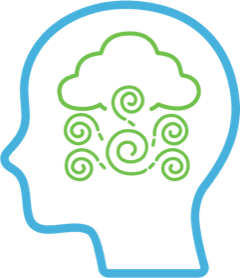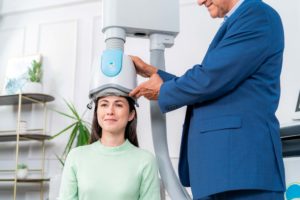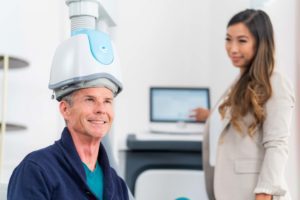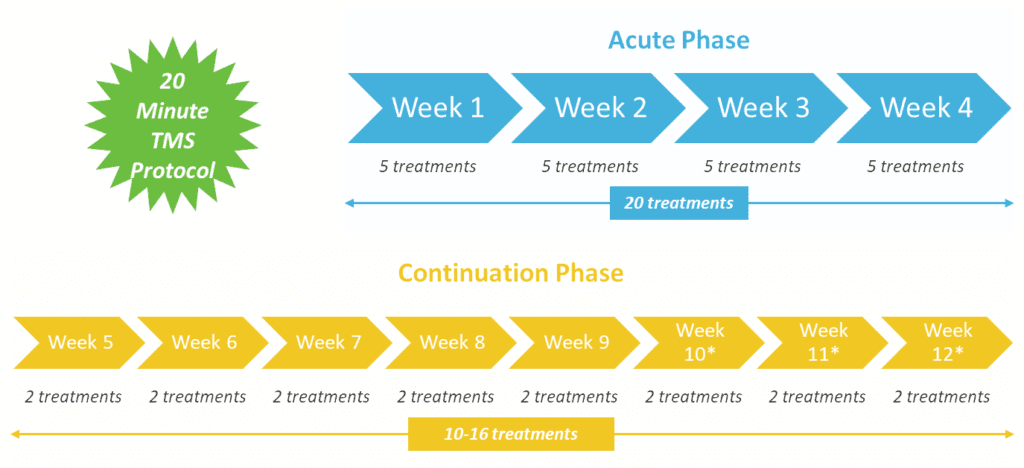

Deep Transcranial Magnetic Stimulation (Deep TMS™) is the FIRST TMS system FDA-cleared to safely and effectively reduce comorbid anxiety symptoms in adult patients with depression, also known as anxious depression.
Deep TMS treatment utilizes magnetic pulses generated by BrainsWay’s patented H1 Coil to stimulate neurons in areas of the brain associated with anxious depression, including the dorsolateral prefrontal cortex (DLPFC) – particularly the left side.
Multiple peer-reviewed clinical studies have found Deep TMS to be a highly effective treatment in treating anxiety comorbid with depression. In a multicenter, double-blind controlled study, Deep TMS showed significant reductions in anxiety symptoms through the acute course of TMS treatments and retained improvement through 16 weeks.
As a noninvasive procedure, Deep TMS is a well-tolerated treatment that does not cause any adverse or long-lasting side effects. It does not require a significant recovery period, and the 20-min treatment can easily be integrated into each patient’s day-to-day schedule.

Anxious Depression refers to anxiety symptoms in patients suffering from Major Depressive Disorder (MDD). It affects approximately 10-16 million adults in the United States each year. This is distinct from patients that experience depression that is triggered by a primary diagnosis of an anxiety disorder, such as generalized anxiety disorder or panic disorder.
Both anxiety and depression have been associated with experiencing distress when facing the unknown. For depression, the trigger is related to a sense of sadness, and anxiety grows from thoughts of a future “threat” whose likelihood remains unclear. While depression is defined by a lack of energy, anxiety is perceived as more of a system overload and is tied to excessive concern over the possibility of experiencing harm.
Common anxiety symptoms include nervousness, feelings of panic, increased heart rate, rapid breathing, sweating, insomnia, trembling, and difficulty focusing or thinking clearly.
Anxious Depression Demographics: Between 60-90% of patients with depression have moderate to severe anxiety. Anxious depression is linked to greater severity of depression symptoms, higher risk of suicide, reduced response rates to treatment, and higher risk of cardiovascular disease and diabetes.
Possible Causes for Anxious Depression: Several neurobiological differences have been observed in patients with anxious depression compared to those with non-anxious depression. This includes white blood cell counts, dysregulation of the hypothalamic-pituitary-adrenal axis, and cortical thinning in the anterior cingulate cortex and insula. Further study is necessary to verify and explore these associations.
Current treatment options for anxiety comorbid with depression are similar to those for anxiety disorders and non-anxious major depressive disorder. Deep TMS offers a new non-medication, noninvasive option that addresses some of the limitations of traditional treatment methods.

Deep TMS: Deep Transcranial Magnetic Stimulation is a noninvasive treatment that utilizes magnetic pulses to safely and effectively regulate the neural activity of target brain structures. FDA-clearance to treat anxious depression was granted in 2021. Deep TMS has many advantages over traditional treatment options – no systemic side effects common to medication, no anesthesia or recovery period, and proven efficacy for treatment-resistant patients.
Psychotherapy: Several forms of talk therapy have been shown to be effective in treating anxious depression. Cognitive-Behavioral Therapy (CBT) shows the patient how to replace negative thoughts with productive patterns of thoughts and actions. Interpersonal Therapy (IPT) addresses issues in current relationships to reduce anxiety and depression symptoms. Problem-Solving Therapy enables patients to better manage stress through identifying barriers, developing creative solutions, and making effective decisions. Psychotherapy requires significant time commitment and may not be sufficient alone when faced with more severe anxious depression.

Psychopharmacology: Several classes of medication have been shown to successfully treat both depression and anxiety symptoms. They include selective serotonin reuptake inhibitors (SSRIs), serotonin and norepinephrine reuptake inhibitors (SNRIs), and tricyclic antidepressants (TCAs). Studies have noted, though, that patients with anxious depression often do not experience sustained symptom improvement after initial treatment successes and have a greater risk of side effects such as weight gain or sexual dysfunction.
ECT: Electroconvulsive therapy induces a brief set of seizures that stimulate the brain’s neural activity. ECT has been found to help alleviate severe depression, but it’s impact on anxiety is debated with some studies showing limited improvement and others showing exacerbation of symptoms. ECT requires full sedation under anesthesia and presents potential side effects such as nausea, confusion, and short-term memory loss.
Lifestyle Changes to Protect Against Anxious Depression: Stress-reduction habits such as improved sleep habits, better diet, and frequent exercise may be beneficial in reducing symptoms of anxious depression. In addition, avoidance of alcohol, drugs, and tobacco is valuable as they may worsen symptoms and can negatively impact other treatment with therapy, medication, or Deep TMS. Lastly, social support groups can provide an effective network to mitigate anxiety and depression.
BrainsWay’s Deep TMS treatment for depression using the H1 Coil has been shown in multiple randomized controlled and open label studies to also alleviate co-morbid anxiety symptoms.
Among 212 subjects in a 2015 multicenter, double-blind, randomized controlled clinical study, Deep TMS compared to sham stimulation showed significantly larger reductions in anxiety symptoms from baseline to week 5 (20 TMS sessions). These improvements were durable for at least 16 weeks.

Further analysis from additional studies, including real world clinical data and a head-to-head study of Deep TMS with medication vs. medication alone, corroborate the statistically significant reduction in anxiety comorbid with depression. When analyzing data from 3 randomized controlled studies on Deep TMS, favorable outcomes were demonstrated when compared to both sham or medication as standard of care.
These results from BrainsWay also compare favorably to other studies of drug-based anxiety treatments. As a reference, published articles from approximately 16,000 subjects in over 70 studies of drug-based anxiety treatments – including studies of standard-of-care medications frequently prescribed for patients suffering from anxious depression and general anxiety disorder – report effect sizes ranging from 0.2 – 0.37.
BrainsWay is the FIRST TMS system FDA-cleared to treat anxiety comorbid with depression.
Please read the full study here.

BrainsWay Deep TMS using the H1 Coil to treat depression has been shown to be well-tolerated across multiple studies. Deep TMS is noninvasive, does not require anesthesia, has no systemic side effects, and can be easily incorporated into the patient’s daily schedule.
Individuals undergoing Deep TMS may experience slight discomfort at the site of treatment. Patients also may experience headaches which typically subside after the initial treatment sessions and can be mitigated by the treating provider and with over-the-counter headache medication. The most serious adverse event, seizures, are extremely rare. A study of Deep TMS treatments from 2010-2020 observed a seizure rate of 2 in 10,000 patients when properly implemented. This compares favorably to rates of 10 to 40 per 10,000 patients with common antidepressant medication.
BrainsWay’s Deep TMS for anxious depression involves 30 to 36 sessions over 9 to 12 weeks, with each session lasting approximately 20 minutes. The course of treatment includes an acute period with daily sessions over four weeks, followed by twice per week continuation sessions.
The following graphic details Deep TMS’s treatment protocol with its Acute and Continuation phases:

Anxiety is a key aspect of many mental health disorders and a central theme in the world of mental health....
Depression is a neuropsychiatric disorder that is expressed in emotional, physiological, and behavioral...
BrainsWay Introduces the First FDA Cleared (De-Novo), Non-invasive, Medical Device for the Treatment...
BrainsWay Introduces the First FDA Cleared, Noninvasive, Medical Device in the addiction space for aiding...